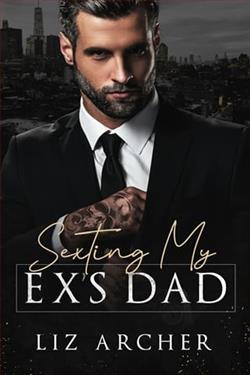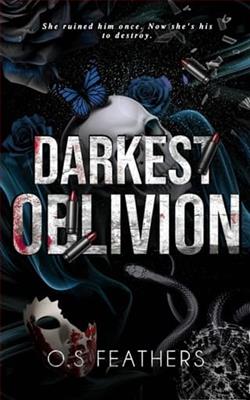Page 80 of Destino
She tucked the center of her dress hem under her and between her thighs. Her arms circled his waist and he again felt more alive than he had in months. Soon they were racing out of the vineyard toward a new destination. He could feel her nervous energy in the way she clung to him. He tried to tell her he’d be extra careful, but she wouldn’t lift her face from his back.
The road to his mother’s villa turned into a long one-way stretch of dirt, paved, and then cobblestone strips mowed through browning grass. After travelling for over thirty minutes he relaxed on the speed, and Mira lifted her head to look around.
“Where are we now?” she said loudly.
“Fiesole,” he answered dryly. “There it is!” he pointed ahead to the aged block shaped lemon yellow building trimmed in plum colored purple, over the hill. The tall grass had rose red wildflowers blooming. Giovanni drove the jeep up to the front of the villa and parked. “This is where Mama lived after we returned from Ireland until Catalina was two. I was fifteen when we were brought here. Catalina wasn’t born until a year later. After that Mama stopped running.”
“Running?” Mira asked into his ear, holding him again tightly around the waist. “What do you mean running?”
“Papa would have preferred to have her in Sorrento, but she resisted this for a while. She was kept here under guard. Here he could have access to her without interference. He couldn’t be separated from her.”
“But why, did he do it by force?” Mira asked.
“Let’s go inside.”
He drove them to the door and held the bike steady while she got off. Giovanni dropped the kickstand and collected the basket and wine. He watched her stroll toward the doors removing her helmet. Giovanni had forbidden Catalina and others from going to the once dilapidated cottage. Just recently he’d had the place painted and the roof replaced. He had to admit he missed his mother intensely whenever he dared to venture here alone. Mira waited for him at the steps. She accepted the basket while he fidgeted with the old lock and forced the wooden door to creak open. Immediately they were overcome by the strong pungent odor of stale air and mildew. To his relief Mira set aside all that was in her hands, drew the curtains back, and opened the dusty windows to allow fresh air in.
When Mira turned he walked away with a large ball of sheets trapped in his strong arms. Every piece of furniture including the mirrors was covered. She brushed the pads of her fingers across the film of dust on the mantle and wondered how long the place had remained untouched. It was then she noticed a portrait in a large silver frame on the mantle. Giovanni continued to open windows on the lower level. She could hear him groan and struggle with a stubborn latch.
Careful of the delicate silver frame she handled it with one hand and wiped the dust off the glass of the frame. The man in the picture had to be his father. He was a strikingly handsome man with jet-black wavy hair that greyed at the temples, and a perfectly shaped mustache that reached his chin. He had hard eyes. They were so dark the irises appeared black in the portrait. He wore a navy blue pinstriped suit and a blue tie on top of a white shirt. In front of him sat a beautiful woman with paler skin, dressed in a matching blue dress. Her hair bright red, long and wavy hung past her shoulders. She had kind eyes. Clear blue like Giovanni’s, there was such a sweet beauty to her. Though the portrait was aged she could see the details of her dress, the freckles on her cheeks and the sweet baby in her arms in a christening gown. To her left stood Giovanni as a teenager, no more than sixteen, wearing a pensive look.
Giovanni spoke behind her, and she jumped. She turned and revealed what had her so mesmerized. He accepted the frame from her. “Papa was so happy when we took this photo. He had a local artist transform it into a painting. It hangs in Mondello now. Mama placed the replica here.”
“You don’t look happy,” Mira said.
“My mother never spoke ill of him, but I was a teenager at that time this picture was taken. I had no delusions of who my father was.”
“It’s hard relating to our parents as teens.”
“More than hard, Bella.” His gaze lifted to hers, the blue had dissolved to a soft violet and she could see tears glisten. He blinked and the illusion of tears cleared, but the beauty of his eyes remained. “Mama took me with her when she fled Sorrento and hid with her cousins in Ireland. Her mother and father wouldn’t have anything to do with her, because of me, but her cousin took us in. She was happy for a short while. We were dirt poor, and she was happy.”
“You weren’t?”
“I knew nothing about poverty. As Don Battaglia’s son I always had the best of everything. I didn’t understand why we had to eat scraps from the dinner tables of others, and wear the rags. Mama could barely make enough to keep us fed through winter with her washboard. Still she acted as if we were free. I felt like we were in hell.”
“You were a boy, confused.”
“After two years in Ireland my misery got the best of me. Kids that I didn’t fit in with taunted me. I defied my mother and called Sicily for my father. I told him where we were.”
Mira held her breath, transfixed by the story. “What happened?”
“He arrived. Our little one bedroom cottage door opened one day and he and his brothers walked in.” Giovanni smiled, but there was no pleasure in this smile. “My mother knew immediately that I had betrayed her. I’ll never forget the look of pain and hurt on her face. It haunts me now. He walked in and kissed her, told her to collect our things. She did as he said without objection. We were immediately taken back to Italy. Soon she was pregnant, and the fight in her was all gone. She never tried to leave again.”
“I don’t understand. He was her husband. Why did she leave him?”
“I told you they were never married.” He said bitterly. Mira realized he had shared that truth with her, but she didn’t find it scandalous. He spoke of it as if their love was some mortal sin. She opened her mouth to apologize and he shook his head. “Don’t. I’m sorry. I didn’t mean to be cross.”
“Your mother made a sacrifice for you. For your sister?” Mira asked.
“Yes.”
“She loved you.”
“She had no one but us. Even in Ireland she was treated with scorn.” He sighed, dropping on the sofa. Mira sat next to him. “My mother arrived in Napoli with her parents at the age of fourteen. Her dad wanted to open up his textile business there, and hearing that they could prosper better than in poverty stricken Ireland, he relocated the family. At the time my father had gained prominence within Mussolini’s Republic. He had a lot of influence.” He ran his hand through his hair and sucked in a deep breath as if the weight of the tale constricted his breathing. Mira ran her hand across his chest to soothe him through the telling.
“I don’t know when he first laid eyes on my mother, but he did. He said once that he’d never seen hair so red on the head of an angel. He said he fell in love at the sight of her.”
“She was a child, only fourteen.”















